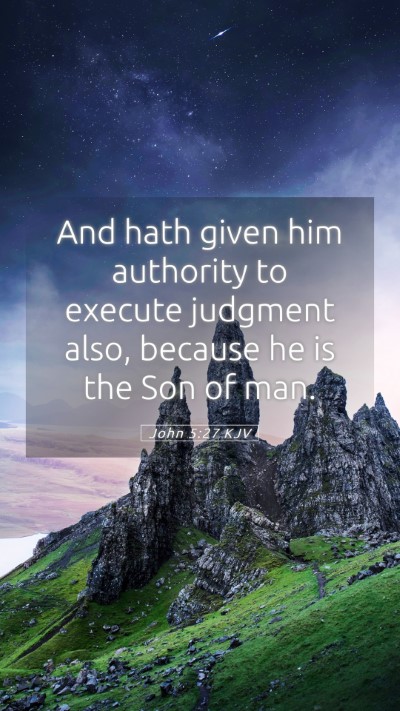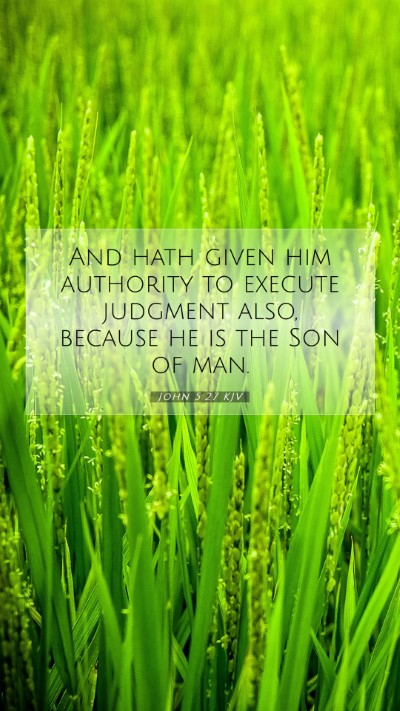Understanding John 5:27
In John 5:27, we read, "And has given him authority to execute judgment also, because he is the Son of Man." This verse emphasizes Jesus' unique authority as the Son of Man and His role in divine judgment. Below, we explore its meaning through insights from various public domain commentaries.
Bible Verse Interpretations
-
Matthew Henry's Commentary:
Matthew Henry highlights that Jesus' title "Son of Man" emphasizes His humanity and connection to human experience. By stating He has authority to execute judgment, Henry asserts this reflects Jesus' divine power bestowed by God. The authority granted is not to be viewed merely as power but carries an intrinsic relationship to His mission of redemption and justice.
-
Albert Barnes' Notes:
Barnes explains that God has given Jesus authority over judgment because of His role as the mediator between Heaven and Earth. He points out that this verse emphasizes Jesus' ability to judge fairly, representing God's will. The reference to judgment involves both the aspect of deciding upon the eternal state of souls and the execution of justice in human affairs.
-
Adam Clarke's Commentary:
Clarke focuses on the profound implications of Jesus being given judgment authority. He explains that this authority distinguishes Jesus from human judges, underlining His divine insight and capability to judge not just outward actions but also the hearts of men. Clarke notes that this judgment authority is inherent to His nature as both God and man.
In-depth Analysis of the Verse
This verse provides critical insights into the dual nature of Christ—fully divine and fully human. The authority to execute judgment is a pivotal theme in John's Gospel. It reminds us that judgment is not solely an event that happens after death, but a continual process where choices in life reflect our relationship with Christ.
Judgment in Context
The judgment aspect addresses both the justice and mercy of God. In the text, Jesus speaks to the authority given to Him in His earthly mission, indicating a connection to His sacrificial role—whereas the final judgment incorporates the ultimate accountability of humanity before God.
Applications for Daily Life
Understanding John 5:27 serves as a reminder of Jesus' role as both Savior and Judge. Believers are encouraged to live in accordance with His teachings, recognizing that our actions and decisions carry weight in the eyes of God.
- Encouragement to live righteously: This verse invites self-reflection on personal conduct and the impact of our choices.
- Emphasis on compassion: Knowing that judgment is paired with grace, believers are urged to extend mercy to others.
- Hope for the future: The truth that Jesus, as King, holds ultimate authority brings reassurance of His plan for justice in a world filled with turmoil.
Related Bible Cross References
- John 3:17: "For God did not send his Son into the world to condemn the world, but to save the world through him."
- Matthew 25:31-32: "When the Son of Man comes in his glory, and all the angels with him, he will sit on his glorious throne. All the nations will be gathered before him..."
- Acts 10:42: "He commanded us to preach to the people and to testify that he is the one whom God appointed as judge of the living and the dead."
Conclusion
The essence of John 5:27 manifests a rich tapestry of meaning regarding Jesus’ role in our lives—all woven together by His authority to judge as the Son of Man. For those seeking bible verse meanings, this passage underscores the importance of understanding Jesus’ dual role, offering both hope and accountability. Engage with scripture through bible study resources to deepen your understanding of such powerful verses.


